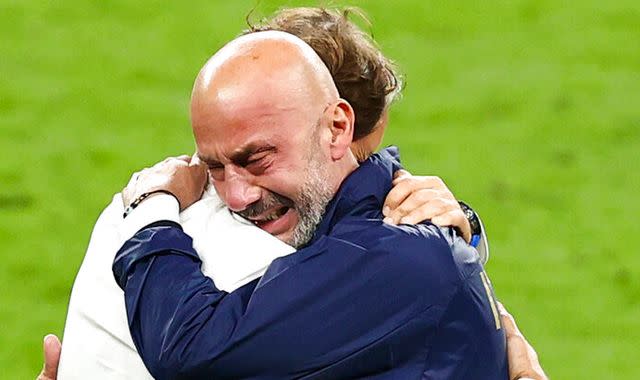Gianluca Vialli: Italy says farewell to a footballing genius who gave us tears, screams, laughter and delight

Italy knew that Gianluca Vialli was dying, but still his loss has shaken this country profoundly.
He was more than just a footballer - he was a cultural figure whose passion for his sport, his country and the sanctity of life came before him.
"Gone too soon," bemoaned the sports newspaper Gazzetta dello Sport, which described him as "our fragile friend" whose "elegance has always been his hallmark".
His was not the story of the poor boy made good. Vialli was the son of a self-made millionaire who grew up in a mansion in Lombardy.
But money could not buy his natural skill as a footballer.
He shone for his local team Cremonese, then for Sampdoria, where his ability drew the attention of the world, and then at Juventus, the giants of Turin, who made him into the world's most expensive footballer and reaped the benefits.
From there, he went on to Chelsea and an enduring love affair with life in London.
But he was never anything other than a proud Italian who worked alongside his dear friend Roberto Mancini in managing the national team.
Their hug, in the wake of victory in the final of the 2020 European Championship, was an image that Italy cherished, and was posted by Giorgia Meloni, the prime minister, in the minutes after Vialli's death was announced.
Because, for all his absolute genius as a player (and really, he was exceptional, breaking the mould of forward play), I suspect Italy's sadness is about something else.
Vialli was passionate, joyful and open with his emotions.
He gave us tears, screams, laughter and exasperation, but always delight.
And he was, by the way, famously stylish - dedicated to the crisp shirt and V-neck jumper look in a way familiar to anyone who has spent time in this country.
He wrote a book about the difference between football in Italy and England and gave the proceeds to charity.
He lived with cancer and suffered its cruel swings between fear, pain, optimism and then, sadly, the disease's final victory over him.
And he did so with a blend of openness and fortitude that we could all hope to emulate.
He worked with the national team until just before Christmas before deciding that he needed to stop.
The sort of person you cannot fail to like.
The kind of footballer who is admired by the players and fans of the opposition. And he is gone at the age of 58.
For Italy - and for all of us - it is a sad day.

 Yahoo News
Yahoo News 